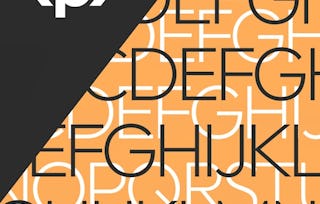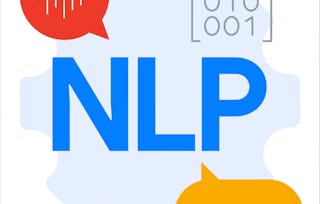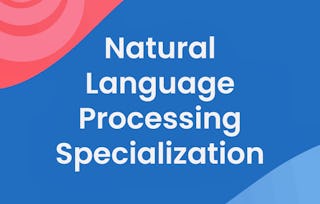This course teaches you the fundamentals of clinical natural language processing (NLP). In this course you will learn the basic linguistic principals underlying NLP, as well as how to write regular expressions and handle text data in R. You will also learn practical techniques for text processing to be able to extract information from clinical notes. Finally, you will have a chance to put your skills to the test with a real-world practical application where you develop text processing algorithms to identify diabetic complications from clinical notes. You will complete this work using a free, online computational environment for data science hosted by our Industry Partner Google Cloud.

Clinical Natural Language Processing

Clinical Natural Language Processing
This course is part of Clinical Data Science Specialization

Instructor: Laura K. Wiley, PhD
6,360 already enrolled
Included with
23 reviews
What you'll learn
Recognize and distinguish the difference in complexity and sophistication of text mining, text processing, and natural language processing.
Write basic regular expressions to identify common clinical text.
Assess and select note sections that can be used to answer analytic questions.
Write R code to search text windows for other keywords and phrases to answer analytic questions.
Skills you'll gain
- R Programming
- Health Informatics
- Natural Language Processing
- Text Mining
- Clinical Data Management
- Clinical Documentation
- Unstructured Data
- Clinical Informatics
- Data Processing
- Google Cloud Platform
- Skills section collapsed. Showing 9 of 10 skills.
Details to know

Add to your LinkedIn profile
See how employees at top companies are mastering in-demand skills

Build your subject-matter expertise
- Learn new concepts from industry experts
- Gain a foundational understanding of a subject or tool
- Develop job-relevant skills with hands-on projects
- Earn a shareable career certificate

There are 5 modules in this course
This module covers the basics of text mining, text processing, and natural language processing. It also provides a information on the linguistic foundations that underly NLP tools.
What's included
7 videos4 readings1 assignment
This module introduces regular expressions, the method of text processing, and how to work with text data in R. Mastery is demonstrated through a programming assignment with applied questions.
What's included
3 videos2 readings2 assignments
This module discusses how the section of a clinical note can affect the meaning of text in the section. A programming assignment provides hands on practice with how to apply this knowledge to process clinical text.
What's included
4 videos2 readings2 assignments
This module discusses how you can build windows of text around keywords of interest to understand the context and meaning of how the keyword is being used. A programming assignment provides hands on practice with how to apply this technique to process clinical text.
What's included
1 video2 readings2 assignments
Apply the tools and techniques that you have learned in the course to a real-world example!
What's included
1 video1 peer review
Earn a career certificate
Add this credential to your LinkedIn profile, resume, or CV. Share it on social media and in your performance review.
Instructor

Offered by
Explore more from Data Analysis
 Status: Preview
Status: PreviewUniversity of Michigan
 Status: Free Trial
Status: Free Trial Status: Free Trial
Status: Free TrialGoogle Cloud
 Status: Free Trial
Status: Free TrialDeepLearning.AI
Why people choose Coursera for their career

Felipe M.

Jennifer J.

Larry W.

Chaitanya A.
Learner reviews
- 5 stars
52.17%
- 4 stars
13.04%
- 3 stars
4.34%
- 2 stars
13.04%
- 1 star
17.39%
Showing 3 of 23
Reviewed on May 21, 2020
Excellent course. Well paced, well thoughtout and put together.

Open new doors with Coursera Plus
Unlimited access to 10,000+ world-class courses, hands-on projects, and job-ready certificate programs - all included in your subscription
Advance your career with an online degree
Earn a degree from world-class universities - 100% online
Join over 3,400 global companies that choose Coursera for Business
Upskill your employees to excel in the digital economy
Frequently asked questions
Unfortunately at this time we can only allow students who have access to Google services (e.g., a gmail account) to complete the specialization. This is because we give students access to real clinical data and our privacy protections only allow data sharing through the Google BigQuery environment.
To access the course materials, assignments and to earn a Certificate, you will need to purchase the Certificate experience when you enroll in a course. You can try a Free Trial instead, or apply for Financial Aid. The course may offer 'Full Course, No Certificate' instead. This option lets you see all course materials, submit required assessments, and get a final grade. This also means that you will not be able to purchase a Certificate experience.
When you enroll in the course, you get access to all of the courses in the Specialization, and you earn a certificate when you complete the work. Your electronic Certificate will be added to your Accomplishments page - from there, you can print your Certificate or add it to your LinkedIn profile.
More questions
Financial aid available,
¹ Some assignments in this course are AI-graded. For these assignments, your data will be used in accordance with Coursera's Privacy Notice.

